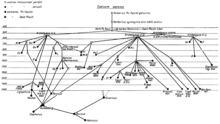Ernst Howald
Ernst Howald , also Latinized as Ernestus Howald (born April 20, 1887 in Bern , † January 8, 1967 in Ermatingen ) was a Swiss classical philologist .
Life
After graduating from the Zurich grammar school, Howald studied classical philology in Heidelberg , Munich and Zurich . In Zurich he also received his doctorate in 1909 with his dissertation The beginnings of literary criticism among the Greeks and qualified as a professor in 1912 ( studies on the technique of Euripidean tragedies ). In the same year he married Anna, the daughter of Carl Schröter .
In 1918 he was appointed as the successor to Professor Hermann Hitzig , who had recently retired and died soon after . He held the chair until his retirement in 1952. In the academic year 1938/1939 and 1939/1940 he was rector of the university.
Howald maintained interdisciplinary studies with Henry Ernest Sigerist , Ernst Meyer and Emil Staiger .
Howald was particularly concerned with neo-humanism and the overall picture of antiquity. In his book Die Kultur der Antike (1948) he emphasized: "The substance, the cultural matter of Europe, is undoubtedly primarily determined by Christianity."
Fonts

- as ed. with Henricus E. Sigerist : Antonii Musae De Herba Vettonica Liber. Pseudoapulei Herbarius. Anonymi De Taxone Liber. Sexti Placiti Liber Medicinae ex Animalibus etc. Teubner, Leipzig 1927 (= Corpus medicorum latinorum. Volume 5).
- as editor: Johann Jakob Bachofen , experiment on the grave symbolism of the ancients. In: Johann Jakob Bachofen, Collected Works. Edited by Karl Meuli using the estate . Basel 1943-1967, Volume 4 (1954).
literature
- Gerhard Baader : Howald, Ernst. In: New German Biography (NDB). Volume 9, Duncker & Humblot, Berlin 1972, ISBN 3-428-00190-7 , p. 664 f. ( Digitized version ).
- Necrology for Ernst Howald. In: Thurgauer Jahrbuch , Vol. 43, 1968 ( e-periodica.ch )
Web links
- Literature by and about Ernst Howald in the catalog of the German National Library
- Heinrich Marti: Howald, Ernst. In: Historical Lexicon of Switzerland
Individual evidence
- ↑ The culture of antiquity. Zurich 1948. p. 239.
- ↑ Howald - Sigerist 1927 (digitized version)
| personal data | |
|---|---|
| SURNAME | Howald, Ernst |
| BRIEF DESCRIPTION | Swiss classical philologist |
| DATE OF BIRTH | April 20, 1887 |
| PLACE OF BIRTH | Bern |
| DATE OF DEATH | January 8, 1967 |
| Place of death | Ermatingen |
